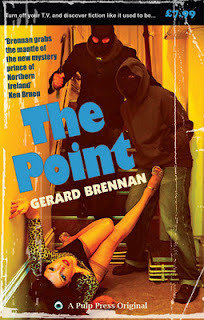Review of The Point by Gerard Brennan, a man with the true comic spirit

I decided to read this novella on my Kindle because, after a couple of excellent legacy-published five-hundred pagers consumed in the previous two days, I wanted a good, short read to bring the evening before yesterday to a pleasant close. I remembered badass writer Raymond Embrack's Twitter recommendation to read it. Ever since Embrack's comment about my novel, The Imitation of Patsy Burke, that "this is airport reading only if you are flying to Sodom", I've had immense respect for his literary acumen.
Before I was five pages
into The Point
 , James Joyce's comment about Flann O'Brien came to mind: "This
, James Joyce's comment about Flann O'Brien came to mind: "Thisis a man with the true comic spirit".
The brothers Morgan,
Brian and Paul are both Belfast born and bred. Hard-drinking womanizers, they
emerge daily from the after effects of gallons of cheap cider and junk food to make a kind of living out of burglary and other ways of living off the community. Although they sometimes manage to pick up a "skank", a drunken woman in a pub, they don't often get the anticipated enjoyment from their conquest. They are so pissed themselves at the moment of
intercourse, that the exploit is only vaguely
remembered, if indeed it ever happened. Had Brian managed to get it up at all last night before
he woke up this morning to find himself in the woman of the house's bath tub? That's about the limit of their philosophical inquiry. Brian's occasional tendency to treat women like human beings--he has his humane moments, is cynically dismissed by Paul.
Paul, the elder brother, is fairly tall and
thin, Brian is short and stout. Paul is a sort of superficially intelligent
and charming predator, but the truth is that his gnat-brain never cops on to the fact that the hand he bites, immediately after it has helped him, or given him a gun, will
boomerslap back into his face or nuts. Brian is a quick thinker,
handy in times of trouble, but more risk-averse than Paul. Free of his brother's influence, he could be easily tempted into getting
a good labouring job and going straight. Brian's cross in life is his loyalty
to Paul, and his willingness to go along with his harebrained,
get-a-few-pounds-quick schemes, such as breaking into a student's digs and ferreting through her underwear while seeing if she has
left her dinner money behind her in the house.
When Paul makes an attempt to move into the
comparative big time, he double crosses Mad Mickey, a forty-year old
hippy Rastafarian crook with a mean streak. Mad Mickey lives in the back of a carpeted
van, illuminated by black light and lava lamps. Paul is given a beating by Mad Mickey's caveman sidekick. Once
he has handed back the money he stole, he receives an ultimatum of one week to get out of the
city. Paul convinces Brian, without telling him why, that it would be a
good idea for them to leave Belfast for a small seaside town called
Warrenpoint, also known as the Point, where they will be able to use their big
city smarts to outwit the local yokels and make some easy pickings. To convey them to their new
destination, Paul decides to literally steal Mad Mickey's van out from under his ass.
Paul's plans get off to a good start, but do not come to fruition in the way he'd anticipated. Brian revels in the provincial calm and falls for a beautiful young woman who
was not afraid to burn the teat off a two-timing lover with a car
cigarette lighter. Reassured that the younger brother Morgan is truly smitten,
she introduces him to the delights of near-sober coupling. Paul, eventually gets to meet the local big man, who has a taste for torturing gamblers who welsh on their debts and, of course, tries to hoodwink him with his urban intelligence. But, as any boy from
Belfast soon discovers when he wanders out of his built-up comfort zone, it
never pays to under-estimate the importance of provincial know-how, know-where and know-when, or Mad Mickey's desire for revenge.
To go back to my first
sentence, this is a novel that is pervaded and carried along by Gerard Brennan's congenital comic spirit. Brennan has a way of using plain language that systematically has you either laughing or chortling. "How in the the hell
did he manage to do that?" you ask yourself after every laugh. You go back a
couple of pages, to try to analyze what happened, and you discover that the skill is very subtle: the meanings
of common phrases are thrown slightly out of skew; moments of
tension are hilariously squashed under absurd stonewall replies; and characters "intelligently" deny ridiculous truths that Brennan has already let the reader
into. Underlying those sleights of the writing hand is a Woody Allen-like sense of
priming and timing. By now you'll have understood that my recommendation is to read The Point
 .
.






Published on March 28, 2012 08:15
No comments have been added yet.



